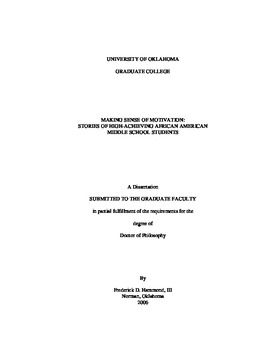| dc.contributor.advisor | Cintron, Rosa, | en_US |
| dc.contributor.author | Hammond, Frederick D., Iii. | en_US |
| dc.date.accessioned | 2013-08-16T12:20:18Z | |
| dc.date.available | 2013-08-16T12:20:18Z | |
| dc.date.issued | 2006 | en_US |
| dc.identifier.uri | https://hdl.handle.net/11244/1060 | |
| dc.description.abstract | The outcomes of this study will exhibit students maintaining high-academic achievements are equally intrinsically and extrinsically motivated. Their meaning making is synonymous with that of the literature, as the students' stories are consistent with the constructs of internal and external control, as well as locus of causality. The faith-based descriptions or reasons for achievement were unanticipated findings, yet significant to the purposely selected sample population included. | en_US |
| dc.description.abstract | Recommendations for future study include a dire need for more in-depth, uni-cultural phenomenological studies, versus multicultural contrasts and comparisons. Additionally, the students suggest student ownership of their classrooms to achieve a class-total desire for academic achievement. Lastly, in a faith-based educational environment, synonymous teacher/faculty-student beliefs are more important than that of the staffs' educational accomplishment when fostering caring, productive intrinsically driven classrooms of excellence producing significant educational achievements. | en_US |
| dc.description.abstract | This qualitative study explored the making sense of motivation, as defined by African American middle school high-achieving students in a faith-based private school in Europe. These high-achievers were active duty military dependants of enlisted men, voluntarily enrolled at a private Christian academy. The data were collected using a survey and observations during one face-to-face collective group interview, utilizing open-ended questions in a structured format. There were three participants in this research project. While it was not the original focus of the project, the faith-based beliefs and scripturally referenced style of parenting and teacher cooperation may have contributed significantly to the findings. The participants were sixth and eighth grades, two were female and one male. Content analysis was used to determine rich, thick descriptions of the data. This study was significant because it extends descriptions of current motivation theories to illustrate how high-academic achievers may not be autonomously driven by intrinsic motivation, but may more realistically integrate various orientations of intrinsic or extrinsic motivation to optimize their goals. The salient results of this qualitative phenomenology will assist future educational researchers in understanding the student perspective on the aforementioned constructs: motivation and academic achievement. | en_US |
| dc.format.extent | xiii, 158 leaves : | en_US |
| dc.subject | Motivation in education Case studies. | en_US |
| dc.subject | Psychology, Developmental. | en_US |
| dc.subject | Black Studies. | en_US |
| dc.subject | Education, Secondary. | en_US |
| dc.subject | Middle school students Case studies. | en_US |
| dc.subject | African American students Case studies. | en_US |
| dc.subject | Religion, General. | en_US |
| dc.title | Making sense of motivation: Stories of high-achieving African American middle school students. | en_US |
| dc.type | Thesis | en_US |
| dc.thesis.degree | Ph.D. | en_US |
| dc.thesis.degreeDiscipline | Department of Educational Leadership and Policy Studies | en_US |
| dc.note | Adviser: Rosa Cintron. | en_US |
| dc.note | Source: Dissertation Abstracts International, Volume: 67-06, Section: A, page: 2106. | en_US |
| ou.identifier | (UMI)AAI3219842 | en_US |
| ou.group | Jeannine Rainbolt College of Education::Department of Educational Leadership and Policy Studies | |
